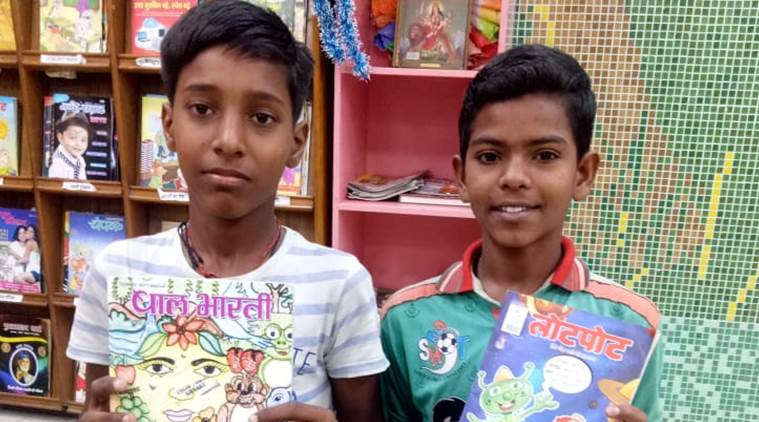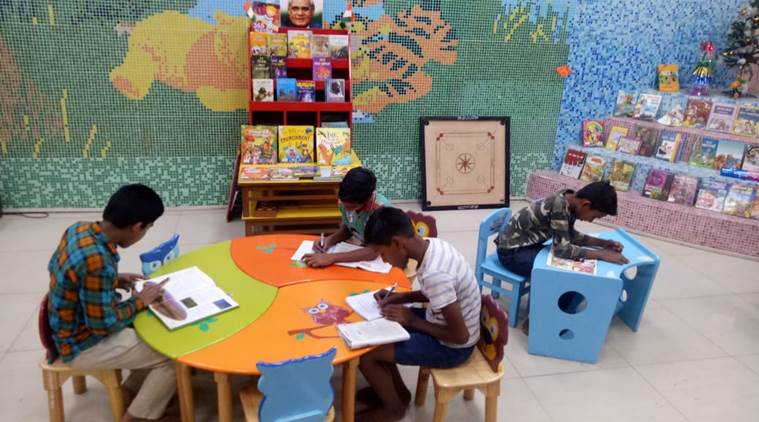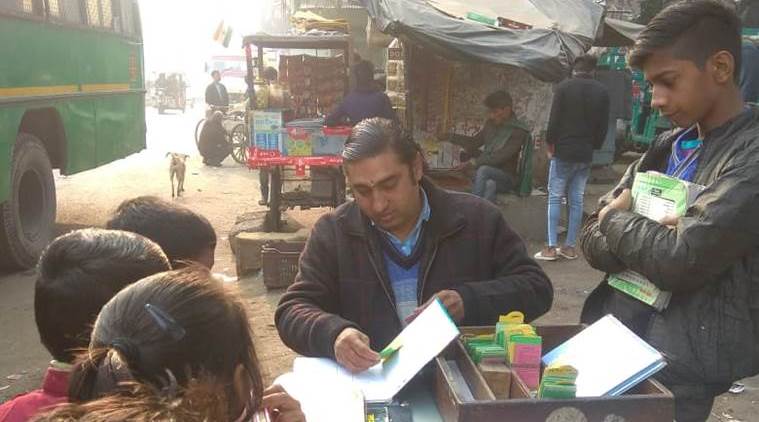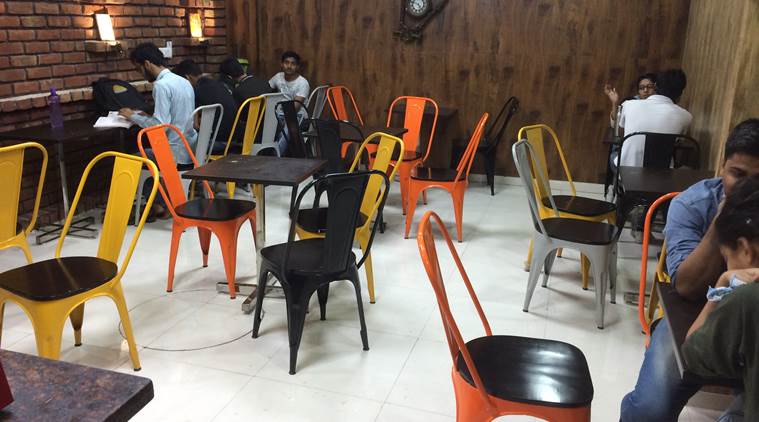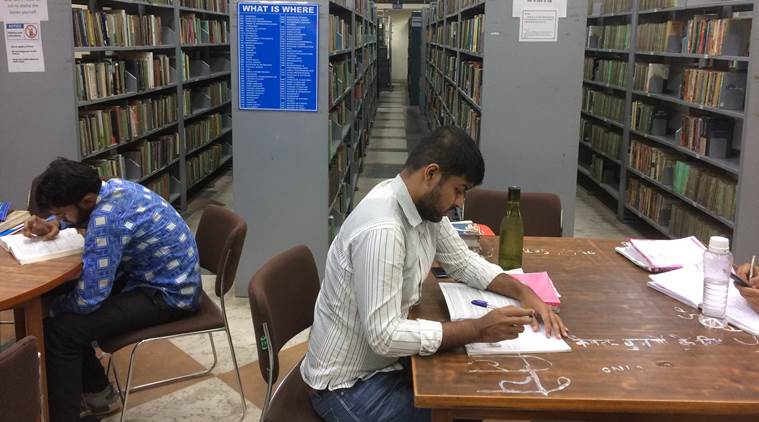The library is also committed to increasing its network of mobile library services, besides community-based initiatives like a ‘Chai-brary’, a gym, children’s section and self-study room.
(Written by Rithika Krishna)
A visit to Delhi Public Library’s headquarters in Chandni Chowk, located next to the metro station, revealed that it’s a lively hub for people of all ages, researching for competitive exams and reading for leisure. The library is also committed to increasing its network of mobile library services, besides community-based initiatives like a ‘Chai-brary’, a gym, children’s section and self-study room.
“I come here often after school, especially to read up on science fiction,” 13-year-old Hrithik Kumar tells us as he thumbs through a copy of Bal Bharathi. He’s at the children’s section of Delhi Public Library’s headquarters in Chandni Chowk with his friend Kundan Kumar. An afternoon spent here is filled with chatter, wide smiles and books, of course, ranging from Enid Blyton, Ruskin Bond, Animal Planet, Guinness World Records, along with essential reading for preschoolers.
The posters on the wall, colourful paper streamers keep the atmosphere cheerful. “After coming here, I realised I love reading about space and sports,” exclaims Kundan Kumar, a 7th grader from D.D.A. Senior Secondary School. Summer camps, which are free of cost, are routinely organised for children in the months of May and June. Apart from creative writing, art and craft workshops, DPL also conducts storytelling and book-reading sessions. Interestingly, while the youngest member at DPL is five-years-old, the oldest is 85, informs Shaira Bano, Library and Information Assistant at DPL.
Outside, one could see the signature yellow buses or mobile libraries, an initiative that began in the year 1954 under the ‘Ghar Ghar Dastak, Ghar Ghar Pustak’ programme. “We have a fleet of 10 buses, aimed at connecting with people who may not have access, such as underprivileged children or housewives,” remarks Dr Lokesh Sharma, Director General, Delhi Public Library.
He recounts how recently, during its weekly route in Azadpur slums in Lalbagh, children as young as seven dashed in joyfully to relish their favourite authors and books. He plans on expanding the model to other cities like Mumbai, Lucknow and Hyderabad. These mobile library services are operational even on Sundays, offering on-the-spot memberships.
He was accompanied by Dr Harish Khanna, former Associate Professor at University of Delhi, who recalled, “As a schoolboy, I remember looking forward to these mobile buses and racing to grab hold of literary works in English to read. Since I was in a Hindi-medium government school, we had access only to translated Hindi editions of plays or essays. It amazes me that these mobile buses are functional even today and evoke the same response in children.” Five more buses will be launched soon, under the CSR initiative of Airports Authority of India.
With nearly 36 libraries operational across the city, DPL recently opened another unit in Bawana Village, opposite the Aditi Mahavidyalaya College with 200-seating capacity. All the libraries, including the headquarters in Chandni Chowk, have special areas reserved for senior citizens, women, visually challenged and an exclusive section for children. At the Chandni Chowk branch, we also came across the ‘Chaibrary’, a new project that has been rolled out for those looking for a quiet spot to read, while sipping a freshly brewed cup of coffee or chai. Adjacent to this, is the gymnasium with a trained instructor.
Chirag Sharma, a BTech student at CH Brahma Prakash Engineering College often drops by at DPL after his exams, in the evenings to study. “With my exam centre just a few metres away, it is convenient to come here. It is quiet compared to the distractions at home.” It helps that entry is free, unlike private libraries, he remarks.
DPL’s self-study rooms are also ideal for those preparing for competitive exams and one can see several students here, buried in books. Naveen Kumar, a BTech graduate preparing for his GATE exams, spends time here, along with his friend Shubham Bose, who says he is thankful for the plethora of questions banks and reference books that are available here.
We also visited the Gazette section at DPL, which is home to valuable journals that are an important resource for academicians, historians and scholars. The shelves are lined with bound volumes in red and black, which are a record of rules, legislations and official announcements. The Gazettes are not available for issuing but can be used for reference purposes.
Meanwhile, at the Newspaper Despatch section, a sliding glass door opens to reveal archives such as a 1952 edition of The Hindustan Times and Navbharat Times, carefully secured under hard covers. Skimming through these assets is a visual treat.
DPL also organises several activities through its Social Education Department, such as membership drives in remote areas to increase readership as well as essay-writing and debate competitions for school children. These outreach sessions are run with the simple motive of spreading the word on the extensive availability of literature. These are complemented by street plays, Kavi Sammelan, Kavya Sanghoshti, Meet the Author in libraries, schools and colleges.
The department also houses a miniature museum called the ‘DPL Newseum Slideshow’, which features rare photographs and Bollywood film advertisements from its newspaper archives. Photographs of former prime minister Indira Gandhi signing the DPL visitor’s book and former prime minister Moraji Desai visiting the premises are displayed here. A vintage model gramophone, Murphy Radio model, accordion and kettledrums are other collections in their archives.
DPL is also staying connected with readers online, with its exclusive e-library that has a repertoire of over 7,00,000 books, which you can access from the centre or your home. Besides free internet access, the Braille library service offers separate systems for the visually challenged. One can also browse a DVD collection, containing environmental and educational programmes. Library services have also been extended to prisoners at Central Jail Tihar, Delhi. “All major universities in and around the city, including Jamia Millia, IITs, AIIMS feature the DPL hyperlink in their official websites, which proves the richness of our collections,” informs Director General Dr Lokesh Sharma.
Under the Delivery of Books and Newspapers’ (Public Libraries) Act, 1954, every Indian publisher is required to submit a copy of their publication to Delhi Public Library. All the copies are inspected carefully before they are displayed for the users to read.
Bound in hardcover, some dog-eared and a few rundown with age, one can lay hands on books from across the world here. “I have been coming here since 8th grade. Since one pass can issue you only three books, I sometimes use my friend’s to issue more,” recalls Nithin Chauhan, who is currently preparing for CA examinations and relies on these spaces to study. He adds, “I am fond of reading books by Khushwanth Singh and Vikram Seth. I have seen how the library has evolved in.
Rithika is an intern at indianexpress.com
Source: Read Full Article

